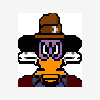So that I case the system for any reason stops functioning they can just reinstall the OS without having to loose all of their files.
How would I go about doing this the right way? Do you need to make different partitions when installing the operating system or can I just make a new partition now? And is this method reccomeneded my experts?















 Sign In
Sign In Create Account
Create Account

